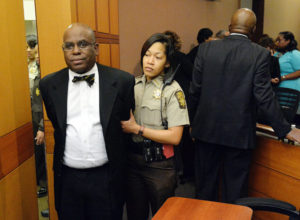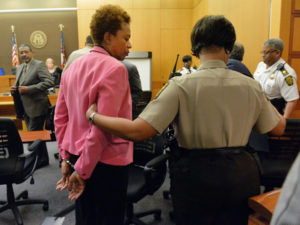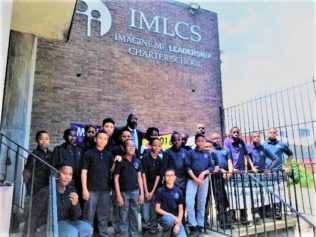More than six months have passed since opening statements were first presented in what has been deemed the largest cheating scandal in U.S. history and now a wave of convictions will finally bring the case to a close. A group of more than 10 Atlanta public school educators were convicted on Wednesday for their roles in inflating standardized test scores along with a series of other immoral practices.
A total of 35 educators were involved in the, case but 21 reached plea agreements and two others, including Superintendent Beverly L. Hall, passed away before they could stand trial.
Of the 12 educators that decided to take it to court, only one was acquitted of any wrongdoing.
The other 11 were immediately placed in handcuffs and escorted out of the courtroom by authorities, as ordered by Judge Jerry W. Baxter of Fulton County Superior Court.
It marked the end of a lengthy case, a parade of former educators marching out the courtroom, but a feeling of victory remained absent.
It didn’t feel as if dangerous criminals were being taken off the streets or that the quality of Atlanta students’ educations had been rescued with the slam of a gavel.
Rather, there was a sense of sadness at watching this spectacle, the educators served up as sacrifice because they believed they had to cut corners to give the impression of success for inner-city kids.
They all have been hit with charges of racketeering and others faced additional charges such as making false statements. The felony charge of racketeering carries up to 20 years in prison.
District Attorney Paul L. Howard Jr., said justice finally has been served.
“Our entire effort in this case was simply to get our community to stop and take a look at our educational system,” Howard said, according to The New York Times. “I think because of the decision of this jury today that people will stop. I think people will stop, and they will make an assessment of our educational system.”
And decide what?
There are many who would argue that the jury’s decision has no connection to that greater cause.
The sheer exposure of the massive cheating scandal launched national discussions about America’s educational system and whether or not the constant use of standardized tests were beneficial for students and faculty alike.
While many educators may not partake in such grand cheating schemes, there are still a number of educators across the nation who feel pressured to do so or find ways to improve students’ test scores through other less detectable but still dishonest means.
That’s the ripple effect of the high-stake standardized tests that are now mandatory in nearly every public school thanks to the 2001 federal education law, No Child Left Behind.
“These tests are high-stakes because they trigger serious consequences for students (like grade promotion and graduation); for schools (like extra resources, reorganization, or closure); for districts (the loss of federal funds); and for school employees (bonuses, demotions, poor evaluations, or firing),” NPR explained when the 12 educators first went to trial. “And so the Atlanta trial should bring two questions: How common is cheating on these tests? And short of cheating, what else might be happening in schools as a result of these tests?”
In theory, these standardized tests are supposed to ensure that students are learning vital material in the classroom.
In reality, they may be working directly against this objective.
With so much resting on the results of these tests, many educators may decide to “teach to the test” and focus on getting students to memorize certain bits of information rather than facilitating comprehension.
Other teachers may restrict the content of their course to materials likely to be on the test, which would be great for test scores but would also severely limit the amount of information students could be getting during class time.
Standardized tests have been perceived by some as a fair barometer of a child’s educational career, whether he is equipped with the knowledge to flourish both inside and outside the classroom.
But more often than not, the tests are really acting as the masked executioner, waiting to bring down the Guillotine on federal funding, graduation hopes, school resources, teacher promotions and even jobs if scores don’t match expectations.
It’s also important to note that these test scores don’t take into account the fact that a wide array of students may comprehend information but are simply poor test-takers. The added pressure of realizing the weight of such exams cam only further stress students who need to have a calm, sound mindset when taking exams.
As 11 educators were handcuffed and placed behind bars, we are reminded that the real threat to the future of children’s education in America is the amount of value being placed on tests that have not been proven to be accurate in measuring a student’s intelligence, academic progress or potential.
“The tiny minority of teachers who cheat cross an ethical bright line that harms the entire enterprise of education,” NPR noted. “But the Atlanta trial should be an opportunity to consider what might be happening in the gray areas as well.”




